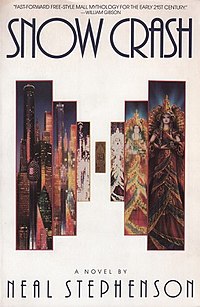
Yesterday, my Michigan hosts took a day off work to take in a rare movie while one child was at daycare and the other with the nanny. We watched the new "Transformers" movie. Eh, it was actually better than my admittedly low expectations. And it's with the same suspension of disbelief that one ought to approach
Snow Crash. The author practically admits this up front, when he introduces his protagonist with a wink and a nudge as Hiro Protagonist. No joke. I'm going to have to differ with
Time's placing this book on its 100 best post-1923 English novels list. If
The Stars My Destination below gets 5 stars (for scifi), this gets 3. Still, the book manages a respectable job of intertwining virtual reality and hacker culture with ancient Sumerian and the Exodus and Babel mythologies with linguistics with the relating religion in particular and conscious thought in general as viral transmissions not at all unlike biological and computer viruses. As additional feathers in its cap, it's responsible for our acceptance of the term "avatar" and the idea of Google Earth. Way back in 1991.
 Robert McNamara, one of the principal architects of the Vietnam War, passed away two weeks ago. That's why we've been seeing a resurgence of reflections on Vietnam lately, just as we've also seen lots of stories about the Apollo landings on this their 40th anniversary. The most memorable tidbit of news I can recall is a quote of post-mortem understanding and forgiveness of McNamara, even of his Gulf of Tonkin fabrications, by a Vietnamese counterpart from the opposite side. I mention all this because it is a lot more concrete than much of this book, despite all its critical acclaim for its representation of the war. Think Apocalypse Now, but less dark, more strange. It's hard to separate what's real and what's not until almost the very end of this story of a squad chasing after one of its own gone AWOL. If you're up for that sort of mindfark, then it's all very skillfully done. But I wasn't. There was still a lot I appreciate. But like war, I'm not sure it was worth it. (As if I know jack about war.)
Robert McNamara, one of the principal architects of the Vietnam War, passed away two weeks ago. That's why we've been seeing a resurgence of reflections on Vietnam lately, just as we've also seen lots of stories about the Apollo landings on this their 40th anniversary. The most memorable tidbit of news I can recall is a quote of post-mortem understanding and forgiveness of McNamara, even of his Gulf of Tonkin fabrications, by a Vietnamese counterpart from the opposite side. I mention all this because it is a lot more concrete than much of this book, despite all its critical acclaim for its representation of the war. Think Apocalypse Now, but less dark, more strange. It's hard to separate what's real and what's not until almost the very end of this story of a squad chasing after one of its own gone AWOL. If you're up for that sort of mindfark, then it's all very skillfully done. But I wasn't. There was still a lot I appreciate. But like war, I'm not sure it was worth it. (As if I know jack about war.)

